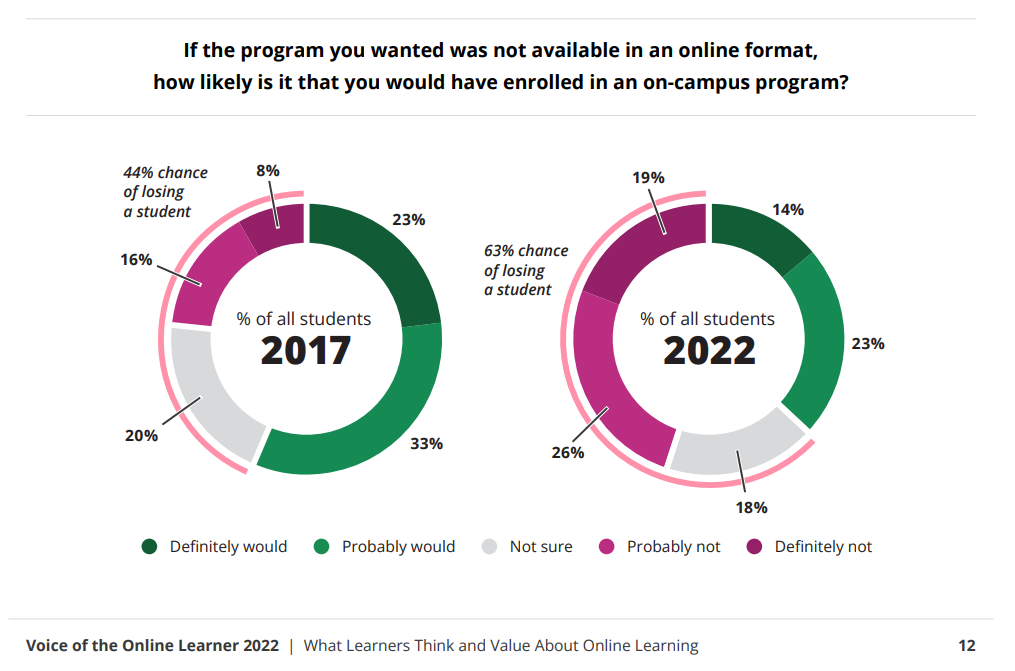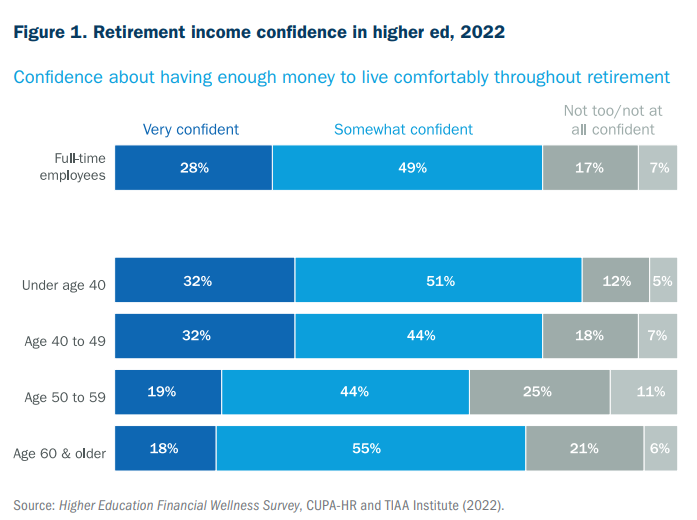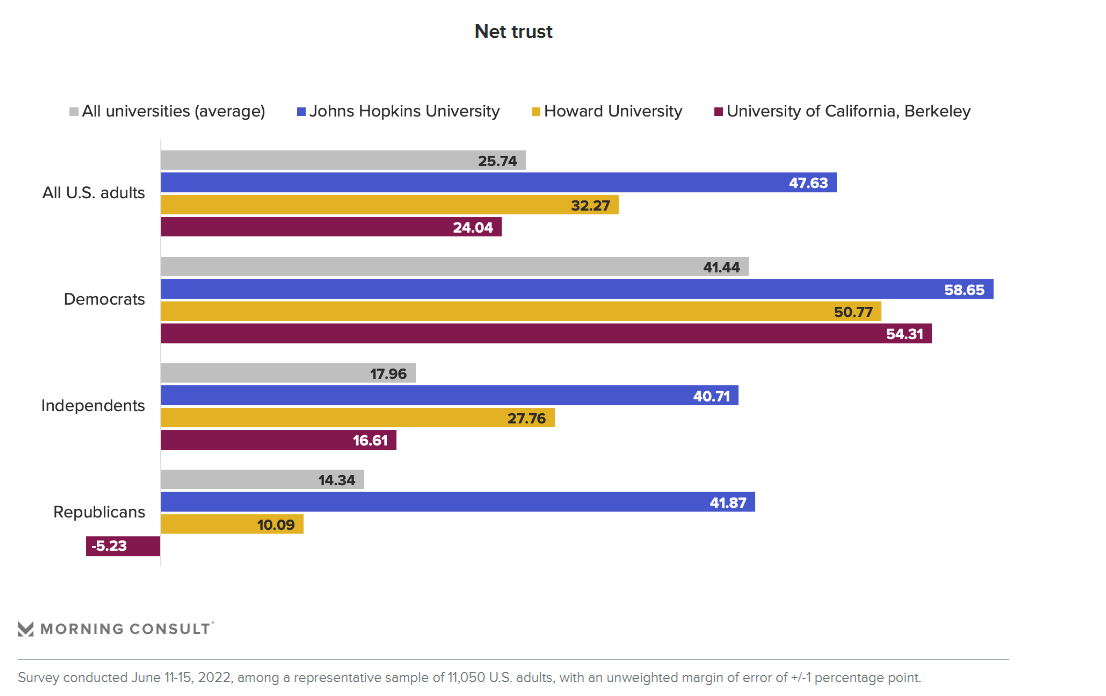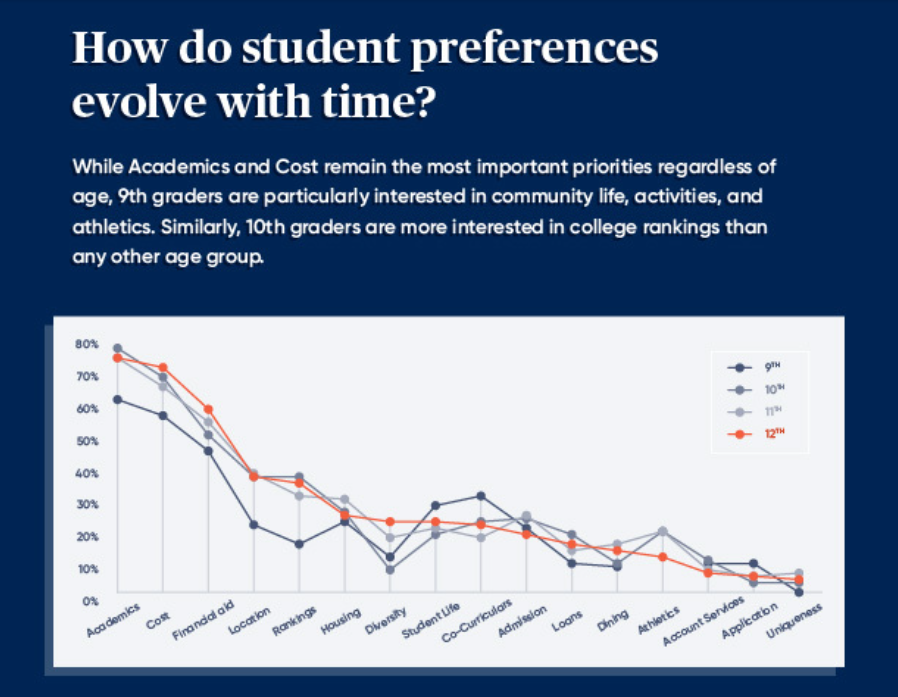Commentary
September has been a busy month for AACRAO Research and other researchers. We have linked 11 other research reports in this month's blog. Highlights from those sources include:
- Confidence in the ability to retire has decreased among members of the higher education workforce.
- Many students see in-person staff support at their institution as unnecessary.
- Student opinion on remote education is at an all-time high.
- Enrolling in some online courses positively impacts degree completion for some students compared to those enrolled in only online courses.
- Gen Z has the lowest trust in U.S. universities compared to any other generation.
- Only one in three students believe that the registrar's office must have services offered on campus.
AACRAO Research Update
2022 Undergraduate Class-Scheduling Practices Early Benchmarking
The report release date is October 17. We shared a few early data points last month from the 340 respondents and are including a few more here:
- 27% agree or strongly agree with the statement, "Our institution engages in student-centered class scheduling;" 31% disagree or strongly disagree; 43% neither agree nor disagree.
- 76% report that midday (10:11 a.m. to 1:59 p.m.) is when most classes typically start in the undergraduate-class schedule.
- 67% offer dual enrollment courses with one or more high-school partners.
Chief Admissions Officer Career Profile Survey
It has been three years since the last Chief Admissions Officer Career (CAdO) Profile survey. I recently invited AACRAO members to complete this survey. If you did not receive the invitation and serve as your institution's CAdO, please email me (wendyk@aacrao.org), and I would be happy to send you an invitation. The data gathered from these surveys serve as a resource for others seeking a career move into the CAdO position and help AACRAO provide related professional
development opportunities.
November 60-Second Survey Topic
The upcoming survey for AACRAO members includes questions regarding their use of degree audit solutions and educational planning solutions based on the working definitions below:
- Degree audit solution: a system that examines all of the graduation requirements for a given educational credential and compares those requirements to elements of a student's official college record.
- Education planning solution: a system that enables a student to indicate in real-time to the institution which courses they intend to enroll in and in what sequence. The institution can use this data to project class demand, support academic
advising, inform institutional resource allocations, assess program viability, etc.
Current Higher Education Research and Related Topics
Students Generally Don't Mind Remote Employees
The Student Voice Survey from Inside Higher Ed and College Pulse, with support from Kaplan, indicates that many students see in-person
staffing as unnecessary. The full report has extensive data on the questions and responses. Some interesting findings include:
- 56% of students believe that counseling and financial aid will always need some staff on campus.
- 12% of students don't believe any department needs an on-campus presence.
- Only one in three students believe that the registrars must have services offered on campus.
- Only one in four students believe that the bursar/student accounts must have services on campus.
- 70% of students indicated that campus safety and security influenced their college decision; 32% indicated it had a great deal of influence.
- 36% of students indicated their college has a one-stop shop for various services (financial aid, bursar, registration, advising, etc.).
- Only 17% of those surveys were dissatisfied with the course registration process at their school.
Higher Education's Role in Fighting COVID-19
The American College Health Association conducted a survey titled "National Survey of College Student COVID-19 Vaccination Uptake, Attitudes, Experiences, and Intentions" which details how colleges have contributed toward vaccination against COVID-19. Key factors in vaccination decision-making include:
- Confidence in the safety of vaccination
- Seeing vaccination as a community responsibility
- Encouragement from family and health care providers
- Vaccine requirements from institutions
New Research Explores Changes in Online Learning Preferences
Wiley University Services examines post-pandemic changes in online learning in this report.
They surveyed 2,500 prospective, current, and recently graduated online learners and found the following:
- There are two distinct types of online learners: those driven by the pandemic and those who are traditional online learners due to preference.
- Student opinion on remote education is at an all-time high.
- There is greater acceptance of occasional synchronous class meetings.
|  |
Fewer Higher Education Employees Have the Financial Confidence to Retire
The TIAA Institute looked at retirement readiness among 1,327 faculty, staff, and administrators currently employed full-time. Key findings included in the report include:
- Among the respondents aged 50-59, the percentage not confident about having enough money to live comfortably throughout retirement are 14% higher than when surveyed in 2019.
- The percentage of respondents aged 60 and older was 8% higher.
- While many respondents are saving more, fewer than 20% are very confident they are saving an adequate amount.
- Two-thirds of those in their 50s and three-quarters of those 60-plus have the same investment allocation for their retirement savings as in early 2020. Still, fewer than 20% are very confident that they invested appropriately.
|  |
Student Completion Rates in Online Courses Increases
A working paper from the Institute of Higher Education at the University of Florida examines an
increase in completion rates among Black, Hispanic, and low-income students who took some online courses compared to those who take all of their courses online.
State of Black Students Attending Community College
A report by the Joint Center for Political and Economic Studies examines the economic outcomes of Black students who attended
community colleges. Data highlights disconcerting trends, such as decreased enrollment, low graduation rates, and graduate earnings far below their white peers.
Younger Generations Less Trusting of Higher Education, Survey Report Shows
Morning Consult measures public trust in higher education across demographic groups. Key conclusions in the most recent report include:
- Party lines strongly split public trust in higher education.
- Gen Z has the lowest trust in U.S. universities compared to any other generation.

Case Study on Competency-Based Education (CBE) Proposes Changes to Transfer
In a case study published in eLiterate, the author examines issues around transfer and transfer students. They propose moving
to CBE to help students transfer between institutions more easily. The paper suggests that CBE will remove some transfer issues, as students who demonstrate competence in an area will get full credit for their prior work. If institutions can agree
on competencies and assessments, less subjective judgment would be a requirement in the evaluation of transfer credits. The article references the following quote from the book Students First: Equity, Access, and Opportunity in Higher Education:
"Universities do not trust competencies[...] When students seek to transfer from one institution to another, they provide their new institution with a transcript. But because learning, teaching, and rigor are so variable; grades so untrustworthy; and perceived institutional quality so uneven, universities are often reluctant to grant full credit for learning the students have done at other institutions. For the 37 percent of students who transfer between colleges at least once, this failure to fully count credit hours adds considerable cost [to] the completion of a degree, often for those who can ill afford it."
College and University Chief Academic Officers Report for 2022
Coursedog supported a report from
Inside Higher Ed and Hanover Research. It provides some interesting insights into how CAOs view their institutions and the future of higher education. Some findings include:
- Most CAOs continue to have a positive view of a liberal arts education, but 88% feel the public does not understand the concept well.
- Only 22% of CAOs agree that their institution very effectively recruits and retains talented faculty.
- 59% of CAOs feel that faculty currently feel very engaged with their work. However, many have concerns that faculty do not feel supported or connected to the administration.

Source: 2022 Survey of College and University Chief Academic Officers
Report Provides Insights on How Students Plan for College
Modern Campus, in partnership with Ruffalo Noel Levitz, researched how high school students in the United States plan for college. The results are presented as an infographic here. Highlights from the data include: - Parents or guardians influence 70% of student decisions.
- Nearly half of prospective students have completed virtual campus tours.
- More than 60% of prospective students start college planning by the 10th grade.
|  |
80 Percent of Ph.D. Faculty in the U.S. Trained at 20 Percent of Universities
An analysis of data from 400 Ph.D.-granting institutions, covering 2011 and 2020, aimed to draw the following conclusions:
- 20% of professors come from eight universities.
- Five to 23% of faculty had employment at universities more prestigious than the program they graduated from.
- More than one in eight current faculty are from Berkeley, Harvard, Michigan, Madison, and Stanford.
- Results suggest that "the professoriate is, and has remained, accessible disproportionately to the socioeconomically privileged."
Please see the report for additional conclusions and more information.